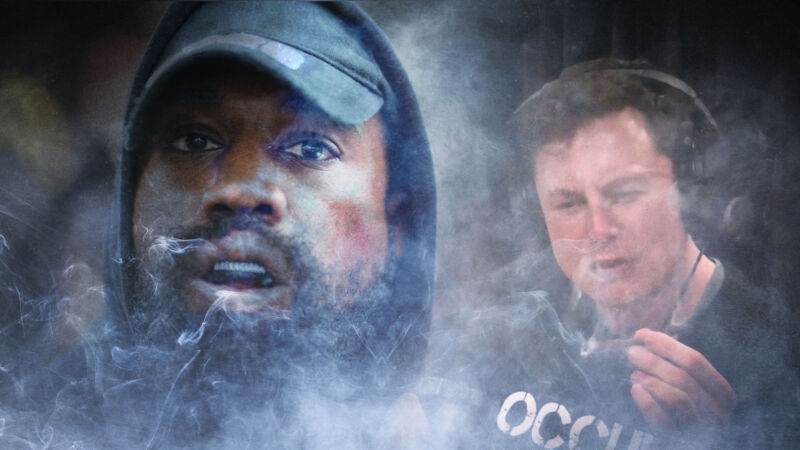

Musk’s one-on-one with Kanye signals naïveté moderating Twitter hate speech
source link: https://arstechnica.com/tech-policy/2022/10/musks-one-on-one-with-kanye-signals-naivete-moderating-twitter-hate-speech/
Go to the source link to view the article. You can view the picture content, updated content and better typesetting reading experience. If the link is broken, please click the button below to view the snapshot at that time.

808s & heart-to-hearts —
Musk’s one-on-one with Kanye signals naïveté moderating Twitter hate speech
Elon Musk chose to address the hate speech via a heart-to-heart with Kanye.
Ashley Belanger - 10/11/2022, 6:27 PM

Self-described free speech absolutist Elon Musk couldn’t resist warmly welcoming Kanye West back to Twitter after the rapper had his Instagram account locked over the weekend for posting a caption that echoed dangerous Nazi propaganda by suggesting that Jewish people today have too much power. On Saturday, Musk replied to a tweet from West criticizing Mark Zuckerberg for the rapper’s Instagram ban, with Musk saying to Kanye, "Welcome back to Twitter, my friend!"
A short time later, West got his account locked on Twitter, too, this time for escalating his antisemitic content. In another tweet, West coldly invoked memories of the Holocaust by suggesting that he would go “death con 3 on Jewish people.” Commentators since have speculated whether West intended to tweet “death con 3” or “Defcon 3,” a military term indicating a high level of defense readiness that the US has only ever reached twice in history. Both meanings, Vanity Fair reported, raised alarm bells, though. “While it was not clear if he’d meant to write ‘Defcon,’ or actually meant ‘death con,’ neither would be great, given the persecution that Jews have historically faced, including that one period in which more than 6 million of them were wiped off the face of the earth,” Vanity Fair’s analysis read.
Musk, like many Republicans, opposes broad social media censorship of hate speech, which he suggests conflicts with First Amendment protections. As controversy swirled, Musk stuck by West, who now goes by Ye and has publicly spoken about his bipolar disorder and his experiences tweeting through manic episodes. On Monday, Musk tweeted, “Talked to Ye today & expressed my concerns about his recent tweet, which I think he took to heart.”
AdvertisementThe Washington Post analyzed the tweet exchanges and suggested that if Elon Musk does indeed take over Twitter, he likely would not have locked Ye’s account. “Between a growing field of state laws that seek to restrict content moderation and Elon Musk’s determination to loosen Twitter’s policies, posts such as Ye’s could soon become more prevalent online,” The Post suggested, while also noting that neither Twitter nor Instagram had clarified which specific policies West’s posts had violated.
While Musk appeared to back West in this content-moderation fight, a few Twitter users mocked Musk on his thread, joking that the billionaire’s content moderation policy, should he ever take the reins and head up Twitter, will be to personally meet with every individual person posting hate speech.
Asked if West would eventually be informed of why his posts violated Twitter rules, a Twitter spokesperson told Ars that Twitter still has nothing beyond its original statement to share: “The account was locked for violating Twitter’s policies.”
Meta did not immediately respond to Ars’ request for comment on its decision to lock Ye's Instagram account and remove posts.
What Twitter users want
Musk’s plan to buy Twitter was largely prompted by his views on free speech, with the billionaire describing the platform last spring as “the digital town square where matters vital to the future of humanity are debated.” More recently, this month, Musk gave up his lawsuit against Twitter that has stalled the buy-out, and the deal was supposed to be back on, but Twitter has since claimed that Musk cannot be trusted to follow through on the deal.
AdvertisementFor Twitter users targeted by hate speech, this deal remaining in limbo leaves open the question of how safe users will be on the platform moving forward. Musk has vowed to loosen content moderation standards, but it’s not clear yet what that will entail. Currently, Twitter’s policies restrict content like Ye's tweet if it threatens violence against a group of people, threatens or promotes terrorism (the FBI recently reported that antisemitic domestic terrorism is on the rise), or promotes violence against people based on race, ethnicity, and religious affiliation.
Although private corporations like social media companies are legally allowed to set policies that restrict speech on their platforms, Musk suggested earlier this year that companies should align policies with laws like the First Amendment, because he says it’s what users want.
“If people want less free speech, they will ask government to pass laws to that effect,” Musk tweeted in April this year. “Therefore, going beyond the law is contrary to the will of the people.”
Musk may not have a complete grasp of what Twitter users want, though. In May, the nonpartisan watchdog group, the Anti-Defamation League, published results of a survey of more than 2,000 Americans reporting their experiences with online hate and harassment. Among survey questions, ADL asked what solutions Americans want social media companies to implement to address the issue. “Both targets of harassment and those who did not report having been harassed want effective action by platforms and more legal accountability,” ADL reported. More than 80 percent of respondents agreed that "social media platforms should do more to counter hate online."
Recommend
About Joyk
Aggregate valuable and interesting links.
Joyk means Joy of geeK